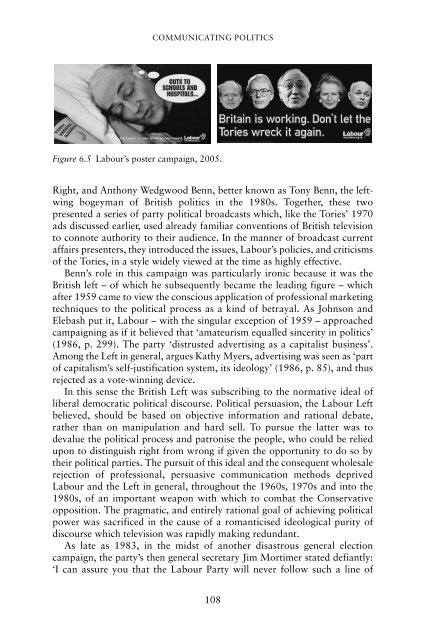20130412164339753295_book_an-introduction-to-political-communication
20130412164339753295_book_an-introduction-to-political-communication
20130412164339753295_book_an-introduction-to-political-communication
You also want an ePaper? Increase the reach of your titles
YUMPU automatically turns print PDFs into web optimized ePapers that Google loves.
COMMUNICATING POLITICS<br />
Figure 6.5 Labour’s poster campaign, 2005.<br />
Right, <strong>an</strong>d Anthony Wedgwood Benn, better known as Tony Benn, the leftwing<br />
bogeym<strong>an</strong> of British politics in the 1980s. Together, these two<br />
presented a series of party <strong>political</strong> broadcasts which, like the Tories’ 1970<br />
ads discussed earlier, used already familiar conventions of British television<br />
<strong>to</strong> connote authority <strong>to</strong> their audience. In the m<strong>an</strong>ner of broadcast current<br />
affairs presenters, they introduced the issues, Labour’s policies, <strong>an</strong>d criticisms<br />
of the Tories, in a style widely viewed at the time as highly effective.<br />
Benn’s role in this campaign was particularly ironic because it was the<br />
British left – of which he subsequently became the leading figure – which<br />
after 1959 came <strong>to</strong> view the conscious application of professional marketing<br />
techniques <strong>to</strong> the <strong>political</strong> process as a kind of betrayal. As Johnson <strong>an</strong>d<br />
Elebash put it, Labour – with the singular exception of 1959 – approached<br />
campaigning as if it believed that ‘amateurism equalled sincerity in politics’<br />
(1986, p. 299). The party ‘distrusted advertising as a capitalist business’.<br />
Among the Left in general, argues Kathy Myers, advertising was seen as ‘part<br />
of capitalism’s self-justification system, its ideology’ (1986, p. 85), <strong>an</strong>d thus<br />
rejected as a vote-winning device.<br />
In this sense the British Left was subscribing <strong>to</strong> the normative ideal of<br />
liberal democratic <strong>political</strong> discourse. Political persuasion, the Labour Left<br />
believed, should be based on objective information <strong>an</strong>d rational debate,<br />
rather th<strong>an</strong> on m<strong>an</strong>ipulation <strong>an</strong>d hard sell. To pursue the latter was <strong>to</strong><br />
devalue the <strong>political</strong> process <strong>an</strong>d patronise the people, who could be relied<br />
upon <strong>to</strong> distinguish right from wrong if given the opportunity <strong>to</strong> do so by<br />
their <strong>political</strong> parties. The pursuit of this ideal <strong>an</strong>d the consequent wholesale<br />
rejection of professional, persuasive <strong>communication</strong> methods deprived<br />
Labour <strong>an</strong>d the Left in general, throughout the 1960s, 1970s <strong>an</strong>d in<strong>to</strong> the<br />
1980s, of <strong>an</strong> import<strong>an</strong>t weapon with which <strong>to</strong> combat the Conservative<br />
opposition. The pragmatic, <strong>an</strong>d entirely rational goal of achieving <strong>political</strong><br />
power was sacrificed in the cause of a rom<strong>an</strong>ticised ideological purity of<br />
discourse which television was rapidly making redund<strong>an</strong>t.<br />
As late as 1983, in the midst of <strong>an</strong>other disastrous general election<br />
campaign, the party’s then general secretary Jim Mortimer stated defi<strong>an</strong>tly:<br />
‘I c<strong>an</strong> assure you that the Labour Party will never follow such a line of<br />
108
















